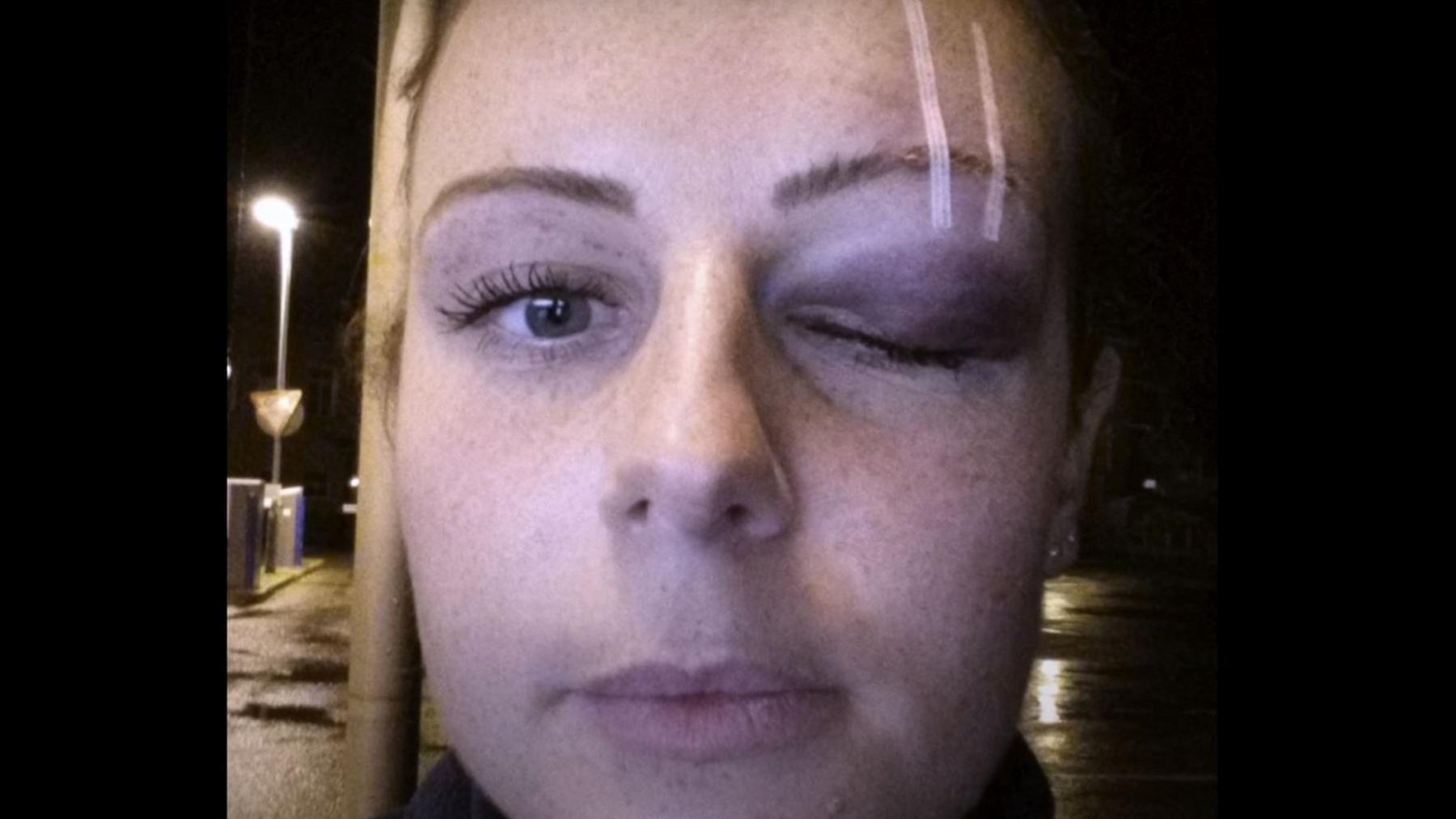Attacks on 999 workers unacceptable, Gwent Police chief says
- Published
Bodycam footage shows moment PC is bitten on the hand during an arrest
A police chief has called for stiffer sentences for assaults on emergency service workers, saying penalties often "don't go far enough".
New figures show attacks including biting and spitting were, on average, 10% higher a month during the pandemic.
Gwent Police Chief Constable Pam Kelly's spoke out at the launch of a campaign by Wales' emergency services, condemning abuse suffered by staff.
The Home Office said it was doubling maximum sentences for such attacks.
"We need to look at these offences and society needs to say they're not acceptable," said Ms Kelly.
"That needs to be reflected in stiffer penalties and stiffer sentences."
With pubs in Wales set to reopen indoors on Monday, there is concern those figures could continue to rise.
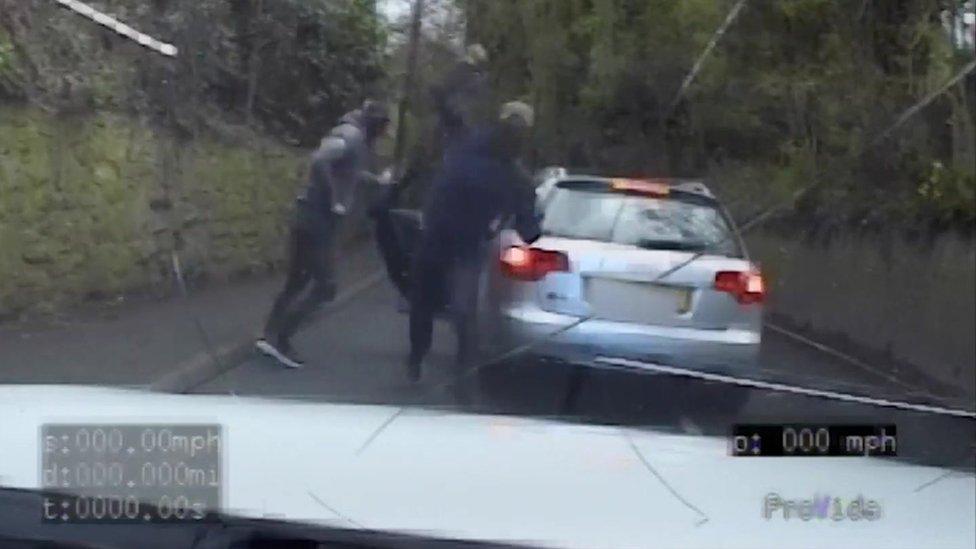
Offenders were caught on camera throwing stones at a police patrol car as an officer tried to question them
Overall crime recorded by police in England and Wales fell by 8% in 2020 as periods of lockdown caused theft reports to drop by more than a quarter, the Office for National Statistics (ONS) said.
However figures from the emergency services show a peak in assaults occurred while lockdown restrictions were being eased last summer - with 256 cases recorded in July and 253 in August.
Most assaults were on police officers, with a third resulting in injury.
The data also shows there were more than 600 instances of ambulance staff being attacked between April 2019 and November 2020.
But proportionately fewer assaults on ambulance staff resulted in some form of criminal proceedings.
The Assaults on Emergency Workers (Offences) Act, external was introduced in 2018, giving courts more severe sentencing powers when emergency service workers have been attacked.
The act doubled the maximum term from six months to 12 in England and Wales.
In 2020, a consultation was launched to consider doubling the maximum sentence again.
Chief Constable of South Wales Police Jeremy Vaughan has warned officers to prepare for a busy few months as nightlife resumed.
He called for people to take personal responsibility when lockdown eased and "not to get in a position where they get so drunk that they are not capable of deciding what they do".
'Penalties don't often go far enough'
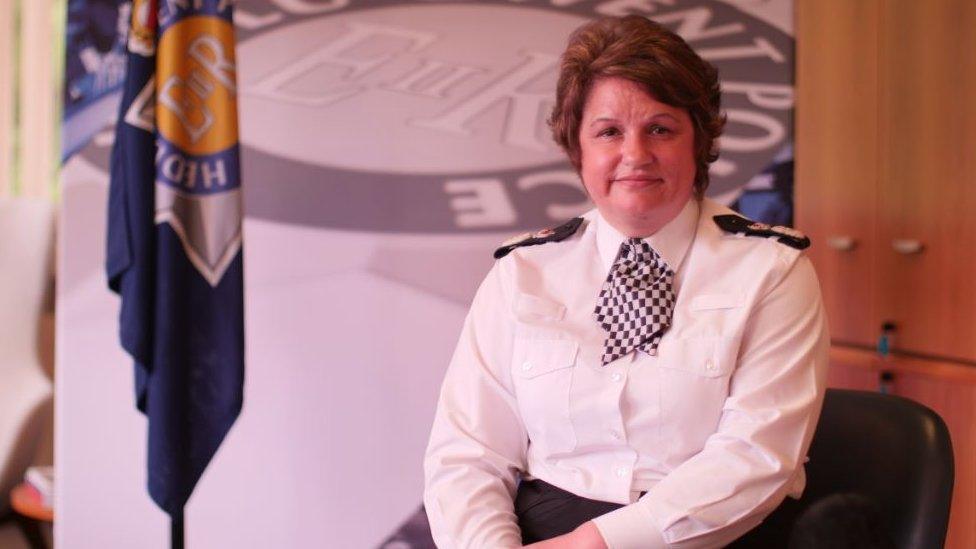
Gwent Police Chief Constable Pam Kelly said some officers did not feel they were being listened to
Ms Kelly said: "My concern is that sometimes the sentences are not what they ought to be and, therefore, our staff are not reporting assaults against themselves because they don't feel like people are listening to them.
"I think we really need to look at sentences and penalties for those people who commit those types of offences.
"It's not right that people who wear the uniform here in Wales are not having justice themselves. The penalties don't often go far enough.
"We need to make sure that when an emergency service worker is assaulted that justice is delivered for them."
The Welsh Ambulance Service said it was concerned about the "severe long-term impact" of the abuse, with some victims unable to return to work for months.
"The impact for the individual is that they can be off work for a period of time, that then has a knock-on effect on the service," said Dylan Parry, project officer for violence and aggression at the service.
"It's been a very, very difficult year-and-a-half. Extremely tough circumstances for our staff to work in.
"It's tough enough on a daily basis without all the extras to go with it."
The emergency services have launched a year-long campaign encouraging the public to "work with us, not against us".
It will focus on key dates coinciding with a spike in assaults - for example large sporting events, bank holidays and Bonfire Night.

Officer assaulted 'quite a few times'
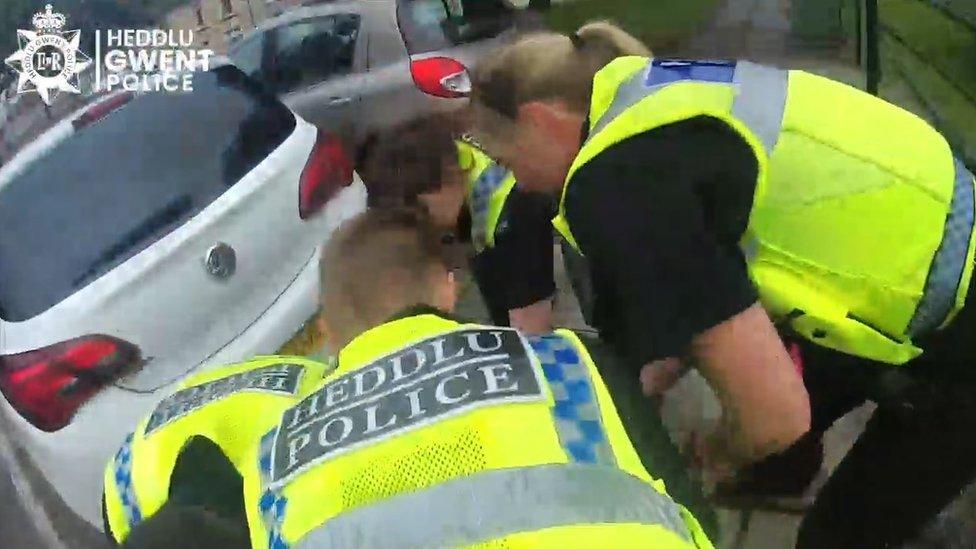
PC Emily Hughes was bitten by a man as she and other officers tried to arrest him
PC Emily Hughes, from Gwent Police, was bitten on the hand while trying to restrain an offender while attending a domestic incident in 2020.
"He was becoming extremely violent towards the officers and not listening to any of the verbal commands," she said.
"I cradled his head to prevent him from causing an injury to himself during which he had bitten me on the hand and broken the skin.
"Unfortunately, I've been a victim of assault quite a few times. It's something that's become more frequent.
"You'd probably struggle to find a serving officer who hasn't been assaulted at some point during their duties."
Criminal reversed vehicle into officer's car
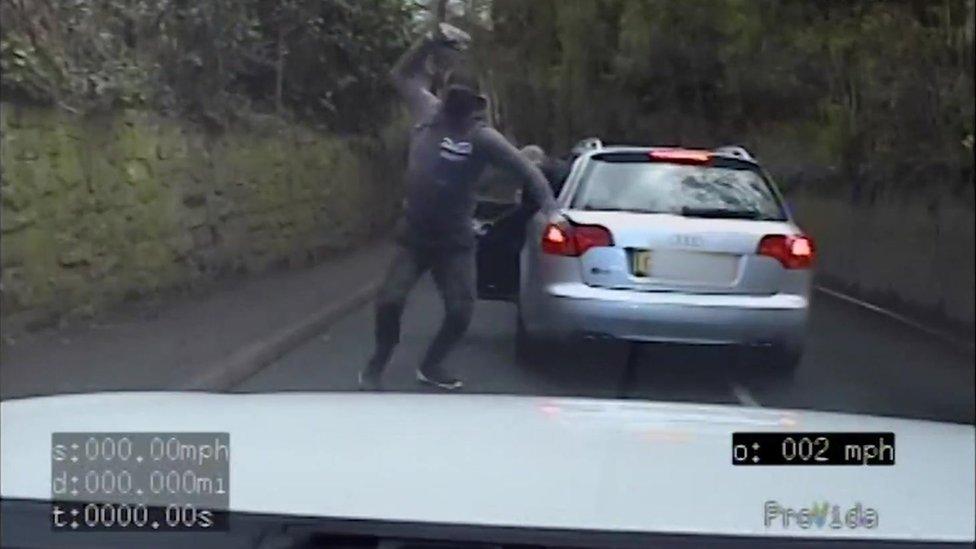
PC Emma Birrell's car was attacked
PC Emma Birrell was on patrol in Northop Hall, Flintshire, when she was asked to keep a lookout for a silver Audi which was believed to be linked to a burglary.
The North Wales Police officer spotted the vehicle and, after signalling it to stop, two men got out and threw rocks towards her car, smashing the windscreen.
They drove off and she continued to follow the car, travelling through nearby Aston Hill and Ewloe at speeds in excess of 80mph before the vehicle stopped after a wheel came off.
It then reversed into police vehicle, injuring the officer, who was taken to hospital.
All four occupants were arrested and later jailed for various offences including burglary, dangerous driving, driving without insurance and driving while disqualified. One of the arresting officers was also injured while making an arrest.
Mr Vaughan, in charge of South Wales Police, said officers were putting themselves in harms way to protect and help the public, and some were being left with lasting trauma.
"People continue to come back to work the next day, or the next week, to protect the public and that amazes me the extent to which everybody across the emergency services is prepared to do that every day," he said.
Will it happen again?
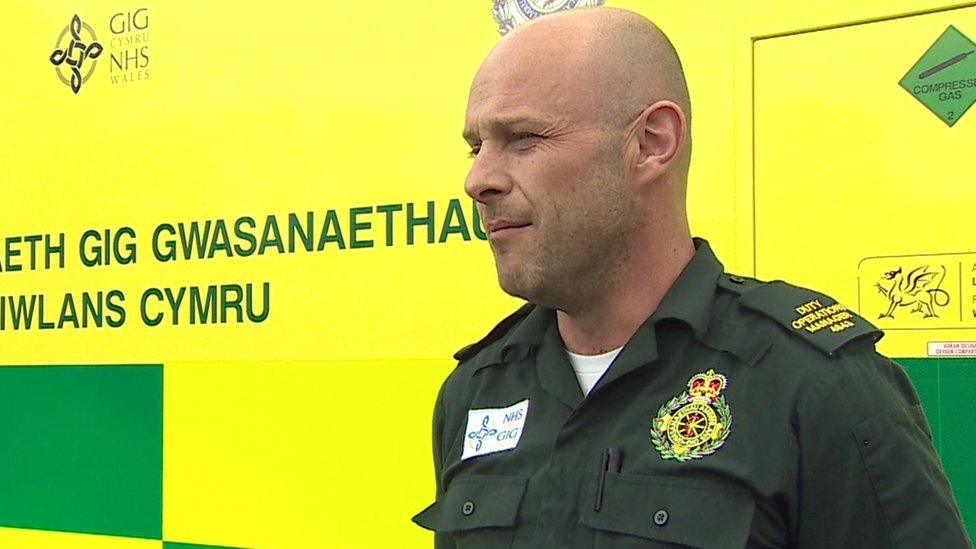
Paramedic Darren Lloyd was helping one patient who became "quite nasty and violent"
Paramedic Darren Lloyd was assaulted by a patient in Bangor, Gwynedd, in April 2019. As a result, the man was jailed for 16 weeks.
He said that having just treated the patient, whom they suspected had suffered a drug overdose, he immediately "turned quite nasty and violent towards us, saying that we had 'ruined his last hit'."
Having assaulted the crew in the ambulance, he followed them outside and continued to attack them in the street.
Mr Lloyd said: "At the time, your adrenaline is rushing and it takes time to settle down.
"But then you start to feel a little bit vulnerable, you start to question why, you start to wonder 'why me? Why did this happen? Did we do anything wrong?'
"That's the bit that worries a lot of us is, what did we do wrong for him to act in such a way? "It's always in the back of your mind, 'will it happen again?'"
Dylan Parry, Project Officer for Violence and Aggression for Welsh Ambulance Service NHS Trust, said some paramedics did not report abuse as it happened so regularly.
"These incidents have a devastating impact sometimes and an impact for the service as well," he told BBC Radio Wales.
"We are there to help. We cannot be fighting for someone's life, if we are fighting for ours."

The UK government said: "Emergency workers are our front-line heroes who put their lives on the line every single day to keep us safe, yet some despicable individuals still think it's acceptable to attack, cough or spit at these courageous public servants.
"Anyone who commits these despicable assaults should expect to face the full force of the law, which is why we are doubling the maximum sentence for those who assault emergency workers."
How many 999 workers have been attacked?
According to research commissioned by Gwent Police on behalf of the Joint Emergency Services Group:
4,240 assaults were recorded against emergency workers, including police, fire and ambulance crews in Wales, between April 2019 - November 2020, with a monthly average increase from 202 cases in 2019 to 222 in 2020
Assaults ranged from kicking, punching and head-butting, to spitting, slapping, biting and verbal abuse
More than half (58%) of incidents took place in south-east Wales, and over a third (37%) were committed by people under the influence of alcohol
As the first round of Covid-19 restrictions eased in Wales, July 2020 (256 assaults) and August 2020 (253 assaults) saw the highest volume of emergency worker assaults, increasing 20% above the monthly average of 212
There were 629 (15%) assaults on Welsh ambulance service staff over the 20-month period, from paramedics to control room staff
Two thirds of the assaults (66%) over the 20-month period were committed against police officers, a third (33%) of which resulted in injury
Although fewer in number - 74 incidents over the 20-month period - the data shows that assaults on fire and rescue service staff peak in November
- Published12 May 2021
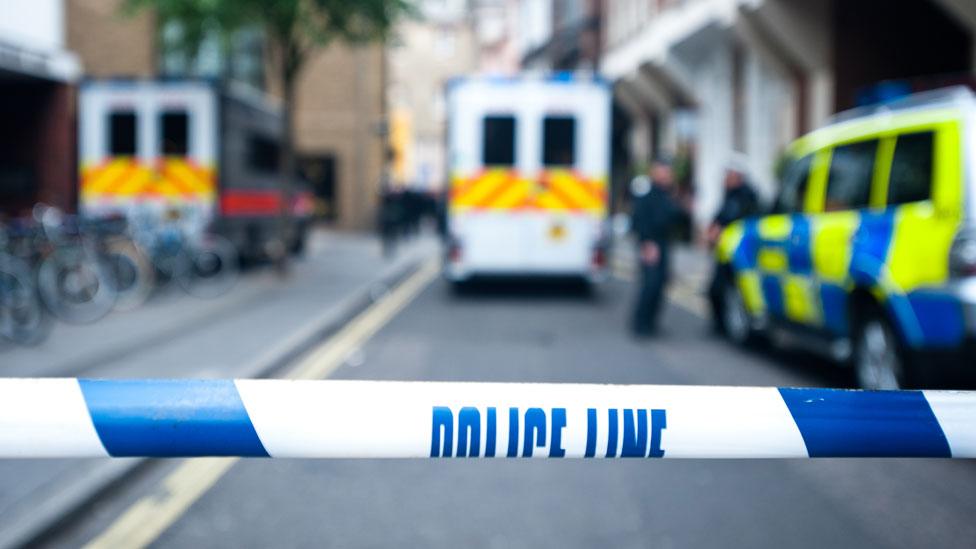
- Published2 December 2020

- Published31 March 2021
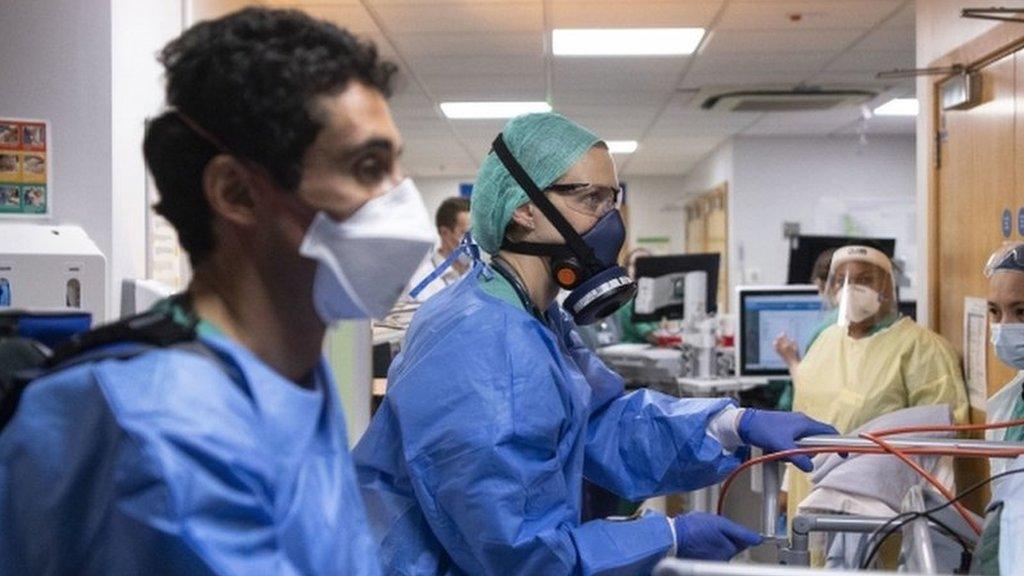
- Published15 September 2020
